Ulupono’s legislative priorities heading into second crossover
Apr 08, 2025

Several of Ulupono Initiative’s bill priorities are being considered during Hawai‘i’s 2025 legislative session’s second crossover. This is an important part of the process that determines whether bills will make it to final reading for this session. Here are highlights of the measures we’re advocating for that advance local food production, renewable energy, clean transportation, or freshwater resources.
Local food production
HB773 proposes funding grant specialist positions within the Hawai‘i Department of Agriculture to help secure and manage agricultural grants. Grant specialists are instrumental in supporting local food producers by helping them apply for federal, state, county, and private funding opportunities, as well as maintaining existing grants amid federal uncertainties.
Renewable energy
HB1020 proposes a statewide environment assessment of geothermal energy exploration and the creation of a slim-hole resource characterization program under the Department of Business, Economic Development, and Tourism in collaboration with the University of Hawai‘i’s Groundwater and Geothermal Resources Center to advance sustainable energy.
Clean transportation
SB1117 seeks to expand Hawai‘i’s Electric Mobility Device Rebate Program to improve access to electric bicycles. The bill clarifies device definitions, expands eligibility and enhances subsidy impact.
Ulupono also advocates for consistent funding for the Safe Routes to School Program to address transportation barriers contributing to chronic absenteeism and several safety issues among public school students. Established by Act 244 (SLH 2023), this program provides low-cost, accessible options for students to get to school and reduces personal vehicle reliance and busing while promoting civic and academic participation.
Freshwater initiatives
HB306 seeks to strengthen the State Water Code by updating penalties and expanding violation definitions. The bill introduces a minimum and maximum penalty for each violation, authorizes the Commission on Water Resource Management (CWRM) to consider each day that a violation exists a separate offense, and establishes factors that CWRM must consider when imposing penalties, which would enable stricter freshwater resource management.
Bookmark our legislative policy page to read the latest status on these bills.

